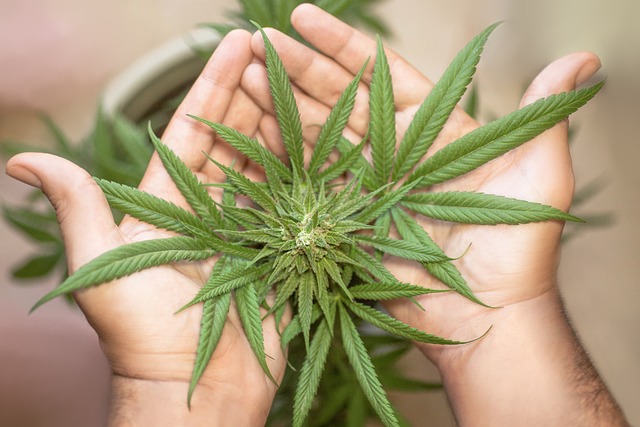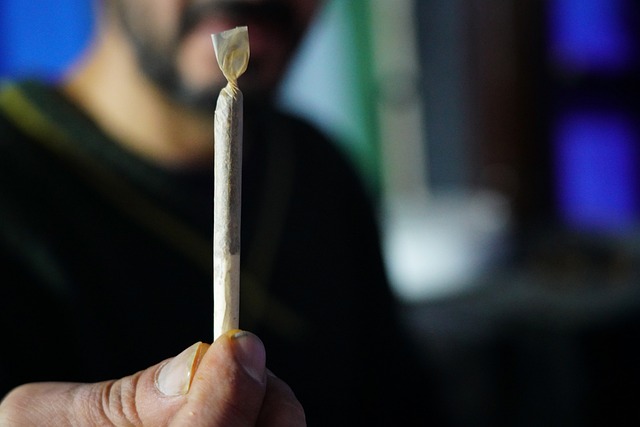2021 marked a significant milestone for Oklahoma as it became one of the leading states in the U.S. by explicitly legalizing THCA-rich hemp with a cap of 0.3% delta-9 THC on a dry weight basis, thanks to its Comprehensive Hemp Act. This legislative change has allowed residents to access and benefit from THCA products, noted for their potential therapeutic effects without causing psychoactive effects. Oklahoma's progressive stance in the cannabinoid space has established it as a significant hub for both consumption and research into THCA legality, with a focus on its non-psychoactive properties. The state's legal framework for THCA is outlined in the Oklahoma Industrial Hemp Act, which requires adherence to strict hemp regulations. Consumers interested in THCA flower must purchase from licensed dispensaries or cultivators that comply with state and federal laws, undergo testing for purity and potency, and provide certificates of analysis (COA) for each batch. Cultivation of THCA-rich cannabis flowers within the state's parameters is a complex process involving strict compliance with regulations like those set by the Oklahoma Medical Marijuana Authority (OMMA). As of early 2023, THCA has been legally recognized under OMMA for medical use. The state's market for THCA flower continues to grow, reflecting its potential therapeutic benefits and the interest in non-psychoactive cannabinoids. With ongoing research and legislative developments, THCA's legal status and applications are poised to expand, positioning Oklahoma at the forefront of healthcare innovation and economic growth within the cannabis industry.
Explore the intricacies of THCA flower, a non-psychoactive cannabinoid with a burgeoning presence in Oklahoma’s market. This article delves into its unique status under state law, offering insights into the benefits and potential health implications associated with THCA. From understanding the science behind its effects to navigating legal sourcing and cultivation practices within the state, gain a comprehensive overview of this promising cannabinoid. We also examine the future landscape, considering market trends, research developments, and the evolving legal framework surrounding THCA in Oklahoma.
- Unraveling THCA Flower: A Deep Dive into Its Legal Status and Benefits in Oklahoma
- The Science Behind THCA Flower: Understanding Its Effects and Potential Health Implications
- Sourcing THCA Flower Legally in Oklahoma: A Guide to Compliance and Quality
- Cultivating THCA Flower in Oklahoma: Regulations, Techniques, and Best Practices
- The Future of THCA Flower in Oklahoma: Market Trends, Research Developments, and Legal Evolution
Unraveling THCA Flower: A Deep Dive into Its Legal Status and Benefits in Oklahoma

Oklahoma has carved out a unique position in the evolving landscape of cannabis legality within the United States, particularly concerning THCA flower. As of recent legislative updates, Oklahoma has established clear guidelines that distinguish THCA-rich hemp from its psychoactive cousin, delta-9 THC. The Comprehensive Hemp Act of 2021 legalized hemp and hemp-derived cannabinoids, including THCA, provided they contain less than 0.3% delta-9 THC on a dry weight basis. This legislative differentiation allows consumers in Oklahoma to legally access THCA flower for its myriad of potential benefits, which are under active research.
THCA, or tetrahydrocannabinolic acid, is the raw, non-psychoactive precursor to delta-9 THC. It’s found in high concentrations in raw cannabis plants and has been the subject of increasing scientific interest due to its purported therapeutic properties. In Oklahoma, enthusiasts and health-conscious individuals explore these benefits, including anti-inflammatory effects, without the psychoactive high associated with delta-9 THC. The state’s favorable stance on THCA-rich hemp has led to a burgeoning market for THCA flower products, offering a range of applications from wellness supplements to dietary supplements. This has positioned Oklahoma as a hub for research and development in the cannabinoid arena, reflecting its commitment to exploring the full spectrum of cannabis derivatives’ potential health benefits within a legal framework.
The Science Behind THCA Flower: Understanding Its Effects and Potential Health Implications

THCA, or Tetrahydrocannabinolic Acid, is a naturally occurring compound found in the Cannabis sativa plant that has garnered attention for its potential therapeutic properties. Unlike its more famous counterpart, THC (Tetrahydrocannabinol), THCA is non-psychoactive, meaning it does not produce the “high” associated with cannabis use. This allows users in regions where such products are legal, such as Oklahoma where THCA-rich flowers are within the legal framework, to explore its benefits without psychoactive impairment.
The science behind THCA’s effects is rooted in its interaction with the body’s endocannabinoid system, a complex network involved in regulating a range of physiological processes. Research suggests that THCA may have anti-inflammatory, anti-nausea, anti-emetic (anti-vomiting), and neuroprotective qualities. Studies on animals and cell cultures indicate its potential in treating inflammation, nausea, and various neurological disorders without the mind-altering effects of THC. In Oklahoma, where the legal landscape has evolved to include certain cannabis derivatives, THCA flower is being explored for its medicinal properties, with users reporting anecdotal evidence of pain relief, reduced anxiety, and improved overall well-being. As scientific investigation continues, the understanding of THCA’s effects and health implications grows, potentially paving the way for new therapeutic applications.
Sourcing THCA Flower Legally in Oklahoma: A Guide to Compliance and Quality

In Oklahoma, sourcing THCA flower within the bounds of the law requires a clear understanding of the state’s regulations regarding hemp and cannabinoids. As of my knowledge cutoff in early 2023, THCA, or tetrahydrocannabinolic acid, is legal under the Oklahoma Industrial Hemp Act. This act defines the legality of THCA flower when derived from hemp with less than 0.3% delta-9 THC on a dry weight basis. To ensure compliance, consumers should only purchase THCA flower from licensed dispensaries or cultivators who adhere to state and federal guidelines. These establishments must have a valid license and follow stringent testing protocols to confirm purity and potency, as well as the absence of any unlawful substances. Additionally, buyers interested in THCA legal in Oklahoma should look for reputable sources that provide certificates of analysis (COA) for each batch of product. These COAs confirm the presence of THCA and its concentration, ensuring a quality experience and safety. It’s crucial to stay informed as laws and regulations can evolve; therefore, consumers must always verify the latest legal requirements before purchasing THCA flower in Oklahoma. By adhering to these guidelines and sourcing from compliant businesses, individuals can confidently enjoy THCA products legally within the state.
Cultivating THCA Flower in Oklahoma: Regulations, Techniques, and Best Practices

Cultivating THCA flower within the bounds of Oklahoma’s regulatory framework requires a meticulous understanding of the state’s laws and best horticultural practices. As of the knowledge cutoff in early 2023, THCA-rich cannabis is legal for medicinal purposes under Oklahoma’s Medical Marijuana Authority (OMMA). Growers must adhere strictly to the OMMA regulations, which include obtaining a cultivation license and following all state-mandated guidelines for planting, cultivating, harvesting, and processing THCA flower.
To successfully cultivate THCA flower in Oklahoma, it is imperative to maintain optimal growing conditions. This includes selecting suitable strains that are high in THCA content, ensuring adequate sunlight exposure, maintaining proper soil pH levels, and employing efficient irrigation systems. Temperature and humidity controls are also critical, especially given Oklahoma’s varied climate. Additionally, integrating integrated pest management (IPM) techniques helps to protect crops naturally while avoiding the residual chemicals that could contaminate the THCA flower. Adherence to these cultivation methods not only ensures a high-quality product but also aligns with the state’s regulations, which prioritize the health and safety of patients who rely on medical cannabis. Growers should stay informed about any legislative changes as Oklahoma’s legal landscape surrounding THCA flower continues to evolve.
The Future of THCA Flower in Oklahoma: Market Trends, Research Developments, and Legal Evolution

THCA, or tetrahydrocannabinolic acid, a non-psychoactive precursor to Delta-9 THC, has been gaining attention in Oklahoma due to its potential therapeutic benefits and versatile applications. As of recent legal updates, THCA-rich flower is legally accessible within the state’s regulated market, opening avenues for consumers and researchers alike. The market trends for THCA flower in Oklahoma reflect a growing interest, with sales data indicating a steady increase in demand. This rise can be attributed to the burgeoning body of research that underscores the unique properties of THCA, which suggest it may offer relief from various conditions without the psychoactive effects typically associated with cannabis.
Looking ahead, the legal evolution surrounding THCA flower is poised to continue shaping its role in Oklahoma’s economy and healthcare system. Legislative changes are expected to align with national trends towards broader cannabis legalization, potentially leading to new product lines and therapeutic applications. Concurrently, ongoing research into the efficacy of THCA is likely to provide further insights into its medical potential, which could further influence consumer behavior and market dynamics. As such, stakeholders in Oklahoma’s cannabis industry are closely monitoring both the legislative landscape and scientific advancements to stay ahead in this rapidly evolving sector.
THCA flower has emerged as a significant topic within Oklahoma’s evolving landscape of cannabinoid products, offering unique benefits and legal considerations. This article has explored the intricacies of THCA flower, from its legal standing in Oklahoma to the science behind its effects and potential health implications. Readers are now well-equipped with guidance on sourcing high-quality, legally compliant THCA flower and insights into best cultivation practices. As the market continues to mature and research progresses, THCA flower’s role is poised for significant growth within the state’s legal framework. Oklahoma’s forward-thinking approach to cannabis regulation paves the way for continued innovation and discovery in this promising field.
